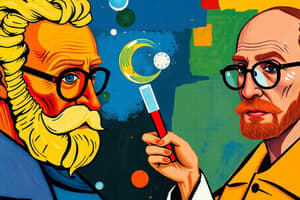Podcast
Questions and Answers
What is the scientific method primarily used for?
What is the scientific method primarily used for?
- To acquire knowledge through observation and experimentation (correct)
- To debate philosophical ideas
- To memorize scientific facts
- To predict future events
Which step of the scientific method involves formulating an educated guess?
Which step of the scientific method involves formulating an educated guess?
- Experimentation
- Observation
- Theory
- Hypothesis (correct)
How does the scientific method promote the growth of scientific knowledge?
How does the scientific method promote the growth of scientific knowledge?
- By preventing theory revision
- By facilitating theory testing and revision based on new evidence (correct)
- By discouraging experimentation
- By promoting blind belief in theories
What is a key characteristic of a scientific theory?
What is a key characteristic of a scientific theory?
Which ancient civilization laid the foundations for mathematics, physics, and philosophy?
Which ancient civilization laid the foundations for mathematics, physics, and philosophy?
What is NOT a component of the scientific method?
What is NOT a component of the scientific method?
Who formulated the laws of motion and universal gravitation, laying the groundwork for understanding the structure and behavior of the universe?
Who formulated the laws of motion and universal gravitation, laying the groundwork for understanding the structure and behavior of the universe?
Which theory fundamentally altered our understanding of space, time, and gravity?
Which theory fundamentally altered our understanding of space, time, and gravity?
What did James Watson and Francis Crick discover that laid the foundation for our understanding of genetics and genetic engineering?
What did James Watson and Francis Crick discover that laid the foundation for our understanding of genetics and genetic engineering?
Which historical period ushered in the Scientific Revolution, a period of great scientific discovery and innovation?
Which historical period ushered in the Scientific Revolution, a period of great scientific discovery and innovation?
What major advancements were made by Muslim and Jewish communities during the Middle Ages?
What major advancements were made by Muslim and Jewish communities during the Middle Ages?
What has science helped us understand regarding human activities and the environment?
What has science helped us understand regarding human activities and the environment?
Flashcards are hidden until you start studying
Study Notes
Exploring the Wonders of Science
Science is an all-encompassing discipline that seeks to understand the natural world through evidence-based inquiry. It's a journey of curiosity, filled with questions and discoveries that have shaped our understanding of reality for thousands of years. In this article, we'll embark on a journey to understand the fundamental principles of science, its historical development, and its impact on our daily lives.
The Scientific Method
The scientific method is the foundation of modern science. It's a process for acquiring knowledge through observation, experimentation, and the development of theories. The method includes:
- Observation: Identifying patterns or anomalies in the natural world.
- Hypothesis: Formulating an educated guess to explain an observation.
- Experimentation: Testing the hypothesis through controlled, repeatable experiments.
- Theory: Formulating a general statement that explains multiple observations.
- Revision: Continuously refining or challenging the theory based on new evidence.
This iterative approach facilitates the growth of scientific knowledge by ensuring that any theory can be tested and refined through future observations and experiments.
A Brief History of Science
Science has a rich history spanning over 2,500 years. Its roots can be traced back to ancient civilizations such as the Greeks, who laid the foundations for mathematics, physics, and philosophy.
During the Middle Ages, science flourished in Muslim and Jewish communities, leading to major advancements in areas like algebra, astronomy, and medicine. The Renaissance brought the Scientific Revolution, a period of great scientific discovery and innovation that laid the groundwork for modern science.
Key Scientific Discoveries
Science has produced countless discoveries that have transformed our understanding of the universe, life, and ourselves. Some of the most important discoveries include:
- Galileo Galilei formulated the laws of motion and universal gravitation, which laid the groundwork for understanding the structure and behavior of the universe.
- Charles Darwin proposed the theory of evolution through natural selection, which explained how species change through time.
- James Watson and Francis Crick discovered the double helix structure of DNA, laying the foundation for our understanding of genetics and genetic engineering.
- Albert Einstein developed the theory of relativity, which fundamentally altered our understanding of space, time, and gravity.
The Impact of Science on Society
Science has a profound impact on our daily lives, including:
- Technology: Advances in science have led to the development of countless technologies, from smartphones to medical imaging.
- Medicine: Science has transformed the field of medicine, leading to the development of antibiotics, vaccines, and modern surgical techniques.
- Environment: Science has helped us understand the impact of human activities on the environment, leading to initiatives to protect and preserve our planet.
Conclusion
Science is a dynamic and enriching discipline that has shaped our understanding of the natural world. Through the scientific method, we continue to discover new truths about the universe and ourselves. By understanding the historical development of science, we can better appreciate the discoveries and inventions that have transformed our world. And by embracing the scientific process, we can continue exploring the wonders of science for generations to come.
Studying That Suits You
Use AI to generate personalized quizzes and flashcards to suit your learning preferences.




